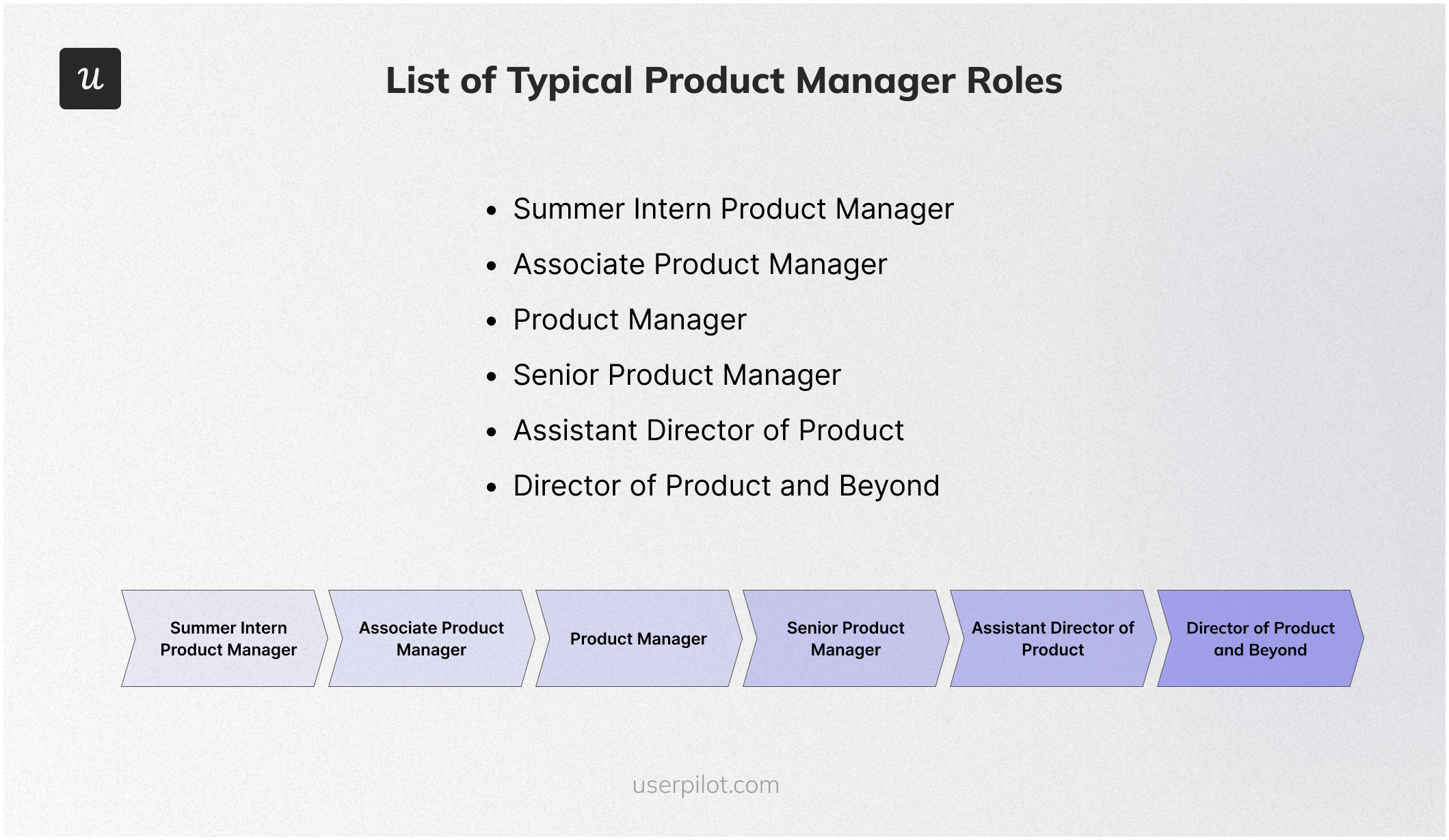![Product Manager Salary [+ Resources to Advance]](https://blog-static.userpilot.com/blog/wp-content/uploads/2024/06/Product-Manager-SalaryResources-to-Advance.png)
Try Userpilot Now
See Why 1,000+ Teams Choose Userpilot

What is a product manager?
A product manager (PM) is a professional who identifies customer needs and defines what a successful product looks like to the broader business objectives. The individual manages the product’s lifecycle from conception through launch and beyond – making strategic decisions to enhance its value and performance.
Product manager’s main responsibilities
Product managers are pivotal in guiding the development and success of software products. Below are the primary responsibilities:
- Product strategy and vision: Define and communicate a clear product vision and strategy aligned with business objectives.
- Market research: Conduct market analysis to identify customer needs, competitive landscape, and industry trends.
- Roadmap development: Create and maintain a data product roadmap that prioritizes features and improvements.
- User feedback: Leverage user engagement tools to gather and analyze customer feedback to inform product decisions.
- Cross-functional collaboration: Work with engineering, design, marketing, and sales teams to ensure cohesive product development and launch.
- Feature specification: Write detailed specifications for new feature announcements and enhancements.
- Agile methodology: Implement agile planning best practices to manage the product development lifecycle.
- Data analytics: Monitor product performance metrics to drive continuous improvement.
How much does a product manager make?
On estimation, a product manager earns a total pay of $196,523 per year, according to Glassdoor. Their average salary is $123,118 per year, with an estimated additional pay of $73,405 per year from channels like cash bonuses, commissions, tips, and profit sharing.
Aside from that, here’s how experience can impact a product manager’s salary:
- 5- 7 years (Product Manager): $120K – $204K per year
- 5 – 7 years (Assistant Director of Product): $136K – $241K per year
- 5 – 7 years (Associate Director of Product): $170K – $274K per year
- 5 – 7 years (Senior Lead Product Manager): $173K – $271K per year
- 5 – 7 years (Lead Product Manager): $182K – $279K per year
- 8+ years (Principal Product Manager): $205K – $316K per year
- 8+ years (Director of Product): $214K – $335K per year
- 8+ years of experience (Senior Director of Product and above): $240K – $382K per year
Industries where the demand for data product management professionals is highest, tend to be the same industries that pay the most on average. Here are salaries from top-paying industries:
- Financial services: $156,728 per year
- Information technology: $149,334 per year
- Agriculture: $145,845 per year
- Energy, mining, and utilities: $145,662 per year
Where you live can have a big impact on how much you make as a product manager. Here are the midpoint salaries for product managers in the following large US cities:
- New York: $126,751 per year
- Boston: $158,728 per year
- Washington, DC: $107,903 per year
- Seattle: $167,677 per year
Product manager career path
Here is a typical career path of a product manager:
- Summer intern product manager: A starting point in the product management career, typically for students.
- Associate product manager: Entry-level position for recent graduates or those new to product management. Progression is by working closely with experienced product managers to learn the ropes.
- Product manager: This role is responsible for managing a specific product or feature. One progresses by developing and implementing product strategies, collaborating with cross-functional teams, and driving product development from concept to launch.
- Senior product manager: This person manages a team of product managers. They progress by leading, mentoring, and supporting a team of product managers.
- Assistant director of product: This individual supports the Director of Product in strategic initiatives and execution. They assist in setting the product vision and strategy, managing larger product initiatives, and driving cross-functional collaboration.
- Director of product and beyond: This senior position involves overseeing significant product areas or teams. They focus on high-level strategy, major product decisions, and team leadership.
Best practices to be a great product manager
How does one become a great product manager? It takes dedication, focus, skill, and understanding to pull it off effectively.
Here are some of the best practices that top product managers recommend:
- Manage tools and resources effectively: Effective management ensures your team is equipped with the right tools and resources to meet project goals efficiently
- Study and understand the product properly to answer questions: You should be able to answer questions from various stakeholders, including team members, clients, and upper management related to the product you’re building.
- Empower your team: A great product manager empowers their team by delegating decision-making responsibilities.
- Influence – not force: Effective leadership is about influence, not coercion. Instead of imposing your ideas or decisions, strive to influence others through active listening, empathy, and collaboration.
- Stick to tough decisions when you make them: While it’s natural to seek consensus and minimize conflict, sometimes you must make unpopular choices for the greater good of the project or company.
Best resources for product managers
The responsibilities of PMs are constantly evolving. Therefore one must stay in touch with the trending world to offer the best services. Here are some of the resources most people use to stay sharp:
Best books for product managers
Books are one of the best places to find knowledge. Here are our top picks:
- INSPIRED: How To Create Tech Products Customers Love by Marty Cagan: Marty Cagan: takes you into unique approaches leading giants like Amazon and Google use in their products. This is the best resource for those interested in discovering the right products and ensuring strong adoption.
- Escaping The Build Trap by Melissa Perri: The book delves into shifting focus from features to value, scaling product organizations, strategy, opportunity pursuit, and outcome-driven culture.
- Start At The End: How To Build Products That Create Change by Matt Wallaert: This book tries to prevent companies from forcing products into the market and encourages them to research customer needs properly.
- Product-Led Growth: How To Build A Product That Sells Itself by Wes Bush: If you want to develop a product-led growth strategy, this book is your go-to resource as Wes Bush shares PLG basics companies need to know.
- Leaders Eat Last: Why Some Teams Pull Together And Others Don’t by Simon Sinek: This book teaches product leaders how to put their teams first.
Best webinars for product managers
Webinars are another great resource for product managers. Here are the top webinars we recommend:
- Userpilot regularly hosts webinars on product growth and user onboarding. These webinars are a great way to learn about the latest trends and best practices in user acquisition and engagement. You can always check the event page to keep yourself updated with their newest webinars.
- Product School hosts free and paid webinars on a variety of product management topics, including everything from product strategy and user research to growth hacking and product marketing. They also have a library of on-demand webinars you can access anytime.
- Mind the Product is a popular resource for product managers, and they often host webinars on a variety of topics. You can find upcoming webinars on their website or subscribe to their email list to be notified about new webinars.
- Brighttalk offers webinars on a wide range of topics, including product management. You can find both upcoming and latest records of webinars on product management by searching for the topic on their website.
- American Product Management Association (APMA) is a professional organization for product managers. APMA offers a variety of webinars and other resources for product managers at all stages of their careers.
Best blogs for product managers
Are you looking for blogs that will increase your product management knowledge? Consider the following five blogs:
- Product management blog by Userpilot: From guides to listicles, this blog has hundreds of articles on product management in the SaaS industry.
- SVPG blog: Marty Cagan founded the Silicon Valley Product Group (SVPG) to share his knowledge and experience with product leaders. Follow this blog and you will learn it all.
- Product Talk: Teresa Torres and her team highlight teachings from her reputable book (Product Discovery Habits) to help product teams build valuable products.
- Product Manager HQ: The Product Manager HQ blog explains essential product management concepts, offering valuable insights and practical guidance to newbie product managers.
- Bring the donuts: A well-known product professional (Ken Norton) offers the best articles in the product management realm.
Best podcasts for product managers
Here are the top podcasts for product managers:
- How to Build Tech Products That Customers Love by Marty Cagan: Listen to how Marty discusses the strengths and limitations of product companies when developing genuine products.
- Becoming a Truly Agile Team: Do you understand what ‘agile’ really means? Listen to this podcast and learn how to use the agile methodology to build a great product team.
- Lenny’s Podcast: Product managers love Lenny because he digs out everything related to product management. Follow his podcasts to learn first-hand from product leaders.
- Global Product Management Podcast: Both newbies and advanced PMs are exposed to content from large tech companies on building valuable products that customers love.
- One Knight in Product: Those involved in designing, managing, building, or marketing products will find this podcast quite useful as Jason Knight interviews product leaders.
Best tools for product managers
Product managers holistically participate in the product’s lifecycle. Thus, they need the right product management tools and specialized software for certain stages. Here are some of the tools one must not miss:
- Best tool for product management: Userpilot – With Userpilot, PMs don’t need to look anywhere else. Benefit from engagement, feedback, and analytics features in one solution.
- Best tool for task management and collaboration: Trello – Trello is considered the most efficient task management tool with great automation features. It allows users to add as many boards as they want.
- Best tool for team management: Asana – Here is another task management tool that simplifies communication. It’s the perfect tool for real-time team collaboration and discussions.
- Best tool for prioritization: Jira – Jira helps you manage tasks and projects, prioritize features and tasks, and ensure better collaboration with team members.
- Best tool for analytics: Zoho – Do you need a tool to easily analyze and track your product’s success throughout its lifecycle? Consider Zoho.
Conclusion
Now that you have a better understanding of the salary range for a product manager position, you can take steps to improve your earning potential. Consider pursuing relevant certifications, developing your skillset, or negotiating effectively during the job offer stage.
Looking into tools for product managers? Userpilot is an all-in-one product platform with engagement features and powerful analytics capabilities. Book a demo to see it in action!








